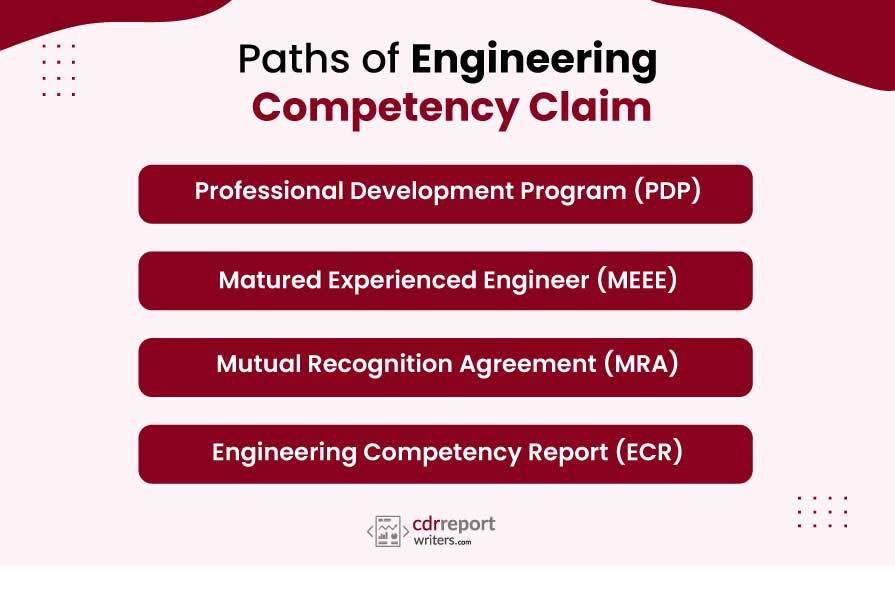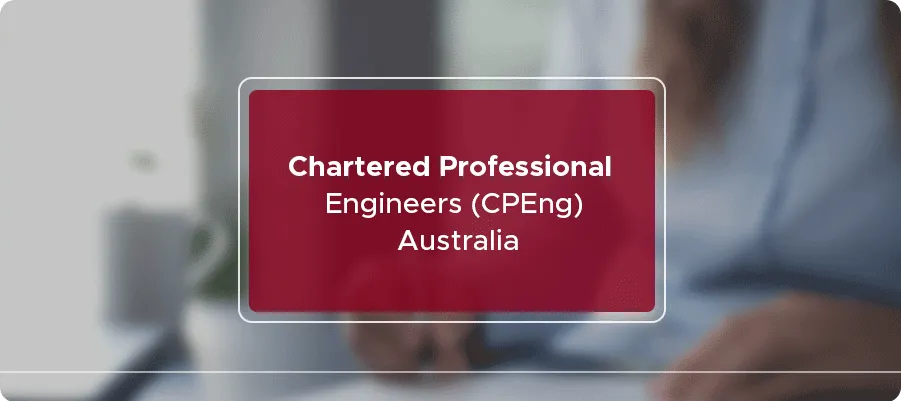
What are Engineering Competency Claims?
For engineers in Australia, obtaining Chartered status or registration on the National Engineering Register is a significant achievement that recognizes their expertise and commitment to their profession. However, achieving this status requires a rigorous assessment of the engineer’s skills and capabilities, including submitting Engineering Competency Claims (ECC).
The ECC is a document that provides evidence of a professional engineer’s talents, capabilities, and skills, and it is a critical component of Engineers Australia’s Stage 2 Competency Assessment.
This assessment evaluates the candidate’s technical and professional competencies against the relevant standards, ensuring that only the most competent and qualified engineers achieve Chartered status or registration on the National Engineering Register.
To create an effective ECC, engineers must provide detailed evidence of their academic qualifications, work experience, professional development activities, and ability to meet Engineers Australia’s Stage 2 competency standards. This report requires the engineer to demonstrate their technical competence, problem-solving skills, communication abilities, and ethics, among other key competencies.
The ECC is one of several papers required for Engineers Australia’s Stage 2 Competency Assessment, but it is perhaps the most crucial. It provides a comprehensive overview of the engineer’s skills and capabilities, demonstrating their ability to meet the high standards required for Chartered status or registration on the National Engineering Register.
The ECC is a critical document for engineers seeking Chartered status or registration on the National Engineering Register in Australia. It provides proof of the engineer’s talents, capabilities, and skills, demonstrating their ability to meet the high standards required by Engineers Australia’s Stage 2 Competency Assessment.
Engineers Australia members who wish to obtain the Chartered status or register on the National Engineering Register must show their abilities following Engineers Australia‘s stage 2 competency standards. Engineers Australia’s Stage 2 Competency Assessment needs several papers, including the ECC or Engineering Competency Claim. It provides proof of a professional engineer’s talents, capabilities, and skills.
How to Write Perfect Engineering Competency Claims?
It takes some effort and commitment when something as significant as being a part of the National Engineering Registrar depends on how successfully an engineer can prepare and present his ECC. Here, we’ll go over some particular elements that will assist you in creating outstanding Engineering Competency Claims.
1. Preparing the claim
The engineer will have to do a lot of thinking in this first stage. It gets recommended that a person journeys back in time to recount and capture a few incidents from his work life in which their patience got tried and they made a significant contribution.
During the planning step, mentally note anything substantial to help you expand on your talents and other interests. Organizing these facts according to career episodes will also be beneficial.
2. Drafting the ECC
Specific considerations to take in mind as a person begins writing their claim based on the preferences and recommendations provided. An applicant must ensure that all material is written narratively and mentioned in the first-person reference.
You must say your support and proof in at most seven hundred words. So be succinct and to the point. It would be best if you avoided grammatical and spelling errors.
Ensure no statements or episodes in your story might lead to assumptions. Always be clear, and before you finish the draft, ensure you’re pleased with what you’ve read and that you’ve answered all of the chartered engineers’ questions.
These factors will determine your ECC score: Authenticity, Validity, Reliability, Current, and Sufficient. It’s important to remember that every ECC submitted will get reviewed and analyzed thoroughly. If you are happy with all the parameters listed, submit your ECC confidently.
Here are some of the processes involved in preparing Engineering Competency Claims:
- Because the ECC requires clear proof, consider at least six key career episodes to which you have made substantial contributions. For example, you may think about your CV, any reports, ideas, specifications, or accomplishments you’ve made over these career episodes. You could also consider the technical issues and activities in the Stage 2 Competency Standards.
- Now that you’ve figured out your major career episodes, it’s essential to figure out their associated competencies. So, please look at Engineers Australia’s 16 competence elements and consider where you’ve used them. You may have used more than one capacity in a single career episode. There may also be particular skills that have never get utilized. If this is the case, start anew and develop a career episode incorporating all your remaining skills.
- Choose the job experiences that best illustrate your talents as evidence of competence for evaluation from these career episodes.
Learn More: Become an Australian Permanent Resident? ✈️✈️
There are things to keep in mind while developing your engineering competency claims:
- Every claim you write should be at most 700 words long. It should describe in detail how you successfully applied the competence elements. Assessors may consider ECCs with a word count of less than 500 unacceptable.
- The assessor wants to know what you’ve done in your career, how you did it, and why you did it. As a result, use narratives and write your Engineering Competency Claims in the first person.
- You may list the activities in bullet points, but you must ensure that the sentences are grammatically precise and make sense.
- In a single career episode, you can showcase the use of multiple elements. However, mentioning at least five career episodes that cover all of the components would be beneficial.
- Always remember that you need to be clear in your writing. Make sure you’re giving the assessor precise and straightforward information.
- Before you write your engineering competency claims, think about some instances. It will give you a clear sense of how to continue and what to concentrate on.
- Use significant career episodes and leave nothing to the assessor’s imagination if feasible. A low word count and a weak career episode might cause insufficient Engineering Competency Claims.
- You only need to describe your predictions, choices, and activities, not your project or how your team fared.
Engineering Competency Claim
The Engineering Competency Claims (ECC) report contains 11 to 16 claims. The E-Chartered assessment pathway determines the number of chosen CPEng or Chartered Professional Engineers. The four paths are as follows:

- Professional Development Program (PDP)
- Matured Experienced Engineer (MEEE)
- Mutual Recognition Agreement (MRA)
- Engineering Competency Report (ECR)
To get evaluated using an Engineering Competency Report (ECR), you must submit 16 Engineering Competency Claims (ECCs). It would be best to describe fully the engineering contribution you made in technical projects during your career as a professional engineer in every Engineering Competency Claim.
Learn More: Temporary Graduate Visa Subclass 485 ⏱⌛️
Components of Engineering Competency Claim
Let’s see the four main components of competency, which are:
1. Personal Commitment
In this section, candidates must demonstrate their capacity to recognize and improve their skills, deal with ethical concerns, and confirm they are responsible for their job.
2. Community Application
In this section, the candidate must demonstrate how they have worked to improve the community throughout their career and how they have produced long-term solutions by understanding the stakeholders’ requirements. They must prove they know the legal standards, regulations, and codes applicable to their employment.
3. Workplace Value
In this unit, candidates must show how they can develop and maintain connections in the workplace, express their ideas effectively, and improve the quality of their work by using tools and processes.
4. Technical Proficiency
In this unit, candidates must demonstrate their ability to apply technical knowledge, solve engineering issues, propose innovative solutions, and assess the consequences and impact of those solutions.
The Assessment Principles of ECC
After you’ve written the claims, you can evaluate them to see if they align with these principles.
1. Authenticity
It would be best to showcase your abilities, not those of your teammates or coworkers.
2. Validity
Do not provide a made-up scenario; instead, include a real-life experience.
3. Reliability
Please clarify that you can rely on your ideas and outcomes in the future if necessary. Nothing has merely happened, just by chance.
4. Current
Engineers Australia does not impose any time limitations. However, candidates get asked to submit career episodes over the previous eight years. If this is not the case, they must first discuss the acceptance of old evidence with their assessor.
5. Sufficiency
Your proof must cover all competency criteria, allowing the assessor to assess your abilities quickly.
Learn More: Why are ANZSCO engineers in such high demand in Australia? ✈️✈️
Why choose CDR Australia Migration?
CDRReportWriters provides CDR reports for engineers wanting to migrate to Australia. Get CDR Writing, Career Episode Writing, Summary Statement Writing, ACS RPL Report Writing, KA02 Report Writing, and more related services from our professional experts.
Wrapping up
In conclusion, Engineering Competency Claims (ECCs) are a crucial component of the assessment process for engineers seeking Chartered status or registration on the National Engineering Register in Australia.
ECCs provide a comprehensive overview of an engineer’s skills, capabilities, and achievements, demonstrating their ability to meet the rigorous standards set by Engineers Australia. To create an effective ECC, engineers must provide detailed evidence of their academic qualifications, work experience, professional development activities, and ability to meet Engineers Australia’s Stage 2 competency standards.
Through this process, engineers can demonstrate their technical competence, problem-solving skills, communication abilities, and ethics, among other key competencies.
By achieving Chartered status or registration on the National Engineering Register, engineers can showcase their expertise and commitment to their profession, assuring clients, employers, and the wider community.
In short, Engineering Competency Claims is an essential tool for engineers seeking to advance their careers and contribute to developing the engineering profession in Australia and beyond.





